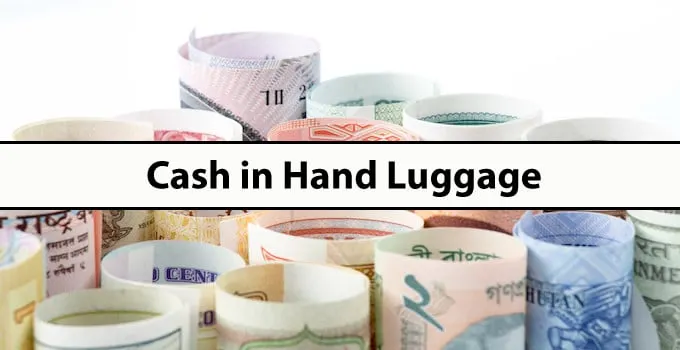Today we talk about cash in hand luggage. But don’t worry, if it’s just a small amount of money that you bring with you in your carry-on, you, you’re on the safe side. More Interesting – or perhaps we should say more cumbersome – it will only get if you carry amounts of 10,000 euros and more. But I don’t want to beat around the bush for too long, instead, I will get straight to the point, as usual. Therefore here, as always, first the most important information in brief:
How much cash can you have in your hand luggage?
Within the EU, you can carry up to 10,000 euros of cash in your hand luggage without having to register your money. If you have more than 10,000 euros, you must declare the cash at customs. Within the EU, a verbal declaration (on request) is sufficient. If you are travelling to the EU from a third country or vice versa, you must declare cash amounts of 10,000 euros or more in writing (to be declared in the red area of the customs control).
What about other currencies?
If you carry cash in a currency other than euros in your hand luggage, the rule is that the amount in the foreign currency must not exceed 10,000 euros (when entering the EU or travelling within the EU). So you would need to check (calculate) whether the amount of foreign currency that you have with you exceeds 10,000 euros or not. If it doesn’t, then no problem.
If you enter Switzerland, the limit is also set at 10,000, however, the amount is 10,000 Swiss Francs (CHF) here and not euros obviously.
What other funds (securities) have to be registered?
Not only cash money in excess of 10,000 euros must be registered, but also other means of payment, also in excess of 10,000 euros. These include:
- Shares
- Cheques and traveller’s cheques
- Passbooks
- Saving Bonds
- Drafts
- Electronic cash
- Precious metals and stones such as platinum, silver & gold
- Diamonds, Rubies, Sapphires, and Emeralds
How and where do I register cash?
The type of registration (oral, written) depends on the travel room in which you are travelling.
If you are travelling within the EU, one oral registration is sufficient.
If you are travelling to the EU from a third country, or vice versa, you must declare cash of €10,000 via a written declaration.
To get a feel for how such a written declaration may look like, please have a look at this written at this cash declaration form (form 0401)
Attention: If you are travelling from an EU country, the registration must be made BEFORE the security check. The written declaration must be made in the red area of the customs control.
Why do you have to declare amounts of 10,000 euros or more at all?
The idea behind this is as follows: The customs administration primarily wants to prevent money laundering and terrorist financing. In addition, these controls should also help to prevent further unfair transactions and the general import of cash from criminal offences.
Cash in your hand luggage or rather in your suitcase?
Does it make sense at all to transport cash in hand luggage or should you rather put the money in your suitcase?
Valuables should always be carried in hand luggage. On the one hand, because checked baggage is often lost or arrives late and on the other hand because the airline has no or only limited liability in such cases.
In addition to valuables such as money and expensive equipment, important medication should always be carried in hand luggage.
How much cash should you take with you?
You can’t really answer this question in a lump sum. The amount of cash you should carry on a trip can vary greatly depending on your destination. Questions you should ask yourself in this context are:
- Can I easily withdraw money at my destination?
- Will my debit card work at all at my destination?
- Is the use of cash at the destination (still) common?
The first two points should be relatively self-explanatory. Nevertheless, you should find out exactly how and where you can withdraw money at your destination. I may still remember when I was in Japan a few years ago and my Maestro card (UBS) hardly worked anywhere. I always had to go to the Japanese Post Office to withdraw money.
The question of whether paying with cash at the destination is still common at all sounds a bit strange at first glance. But there are indeed countries where the use of cash is not very common anymore.
The best example might be China.
Although it is still possible to pay with cash in China in the vast majority of cases, it is the case that in China’s big cities, in the vast majority of cases, payments are made digitally via mobile phone. Most transactions are made via WeChat or AliPay.
So instead of taking lots of cash with you, it might make sense to open a Wechat or Alipay account and connect your bank card to the service, and then pay directly via your mobile phone (via QR code).
Where can I get more information about cash subject to declaration?
You will find the necessary information on the customs website of the country you are travelling to. As for the U. S., you can find some information on the website of the TSA.
- German Customs Info about Cash in Personal Luggage
- UK Customs: Take cash in and out of the EU
- U. S.: Traveling with large amounts of cash
If you are interested in the EU rules for the declaration of cash (as described above), you might want to have a look at the official document from the European Parliament and the Council of the European Union: Regulation (EC) No 1889/2005
Related Questions
What are equivalent means of payment?
In this context, when we talk about means of equivalent payment, we mean that such means of equivalent payment are treated like cash in this context. In this case, such equivalent means of payment can be, for example, savings books and electronic money.
What travel allowances apply within the EU?
Within the EU, most goods are subject to free movement. But in addition to cash, there are other goods for which there are restrictions. These include, for example, medicines and narcotics, fireworks, media harmful to minors as well as weapons and ammunition. For more information, please get in contact with the customs office of the destination country.
How many cigarettes can you import into the UK?
As a traveller, you can import a total of 200 cigarettes duty-free into the UK when entering or returning from non-EU member states (and other special areas). Within the EU, there is no restriction on the amount of cigarettes that you can bring. However, the cigarettes must be intended for personal use. If you will bring more than 800 cigarettes, you might be questioned by a customs officer.
How much cash in hand luggage can I bring to Switzerland?
As Switzerland is not an EU country, other hand luggage regulations may apply. Often the same rules apply, but not always. So what about cash in hand luggage when your journey takes you to Switzerland?
In principle, money such as cash, foreign currency, and securities can be brought into Switzerland, through Switzerland or out of Switzerland without restriction. Cash does not have to be declared. However, checks can also be carried out in Switzerland. In Switzerland, you will be questioned in this context if the amount of money exceeds 10,000 Swiss francs. For more information, please contact the Federal Customs Administration.
Is it permitted to carry alcohol in hand luggage?
For alcohol, the rules for liquids in hand luggage must be observed. Alcohol can therefore only be carried in hand luggage in very small quantities (would have to be filled into 100 ml containers). With one exception: Alcohol from the duty-free shop may be taken along in addition to the regular hand luggage. More about this in our article: Alcohol in hand luggage

Hey guys! It’s me, Marcel. I am the proud owner of carry-on-baggage.com. I am dealing with hand luggage related issues on a daily basis and I own several websites in this niche. Travelling is one of my biggest passions in life and I, therefore, happen to know a thing or two about hand luggage. I hope you all have a safe trip! Take care and thanks for the support. I really appreciate it.
